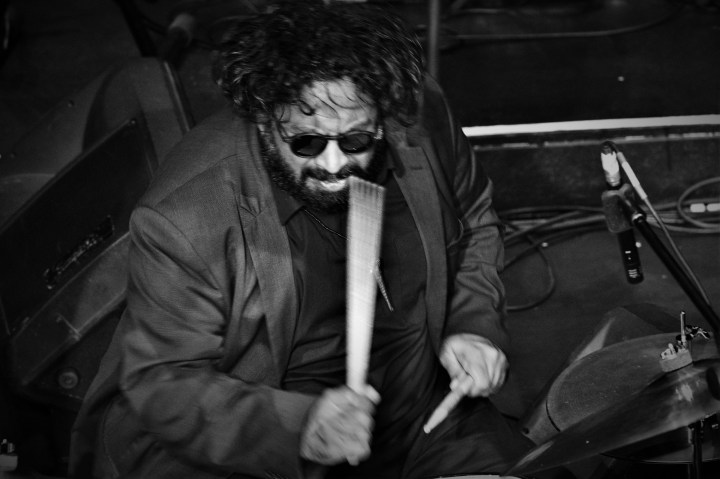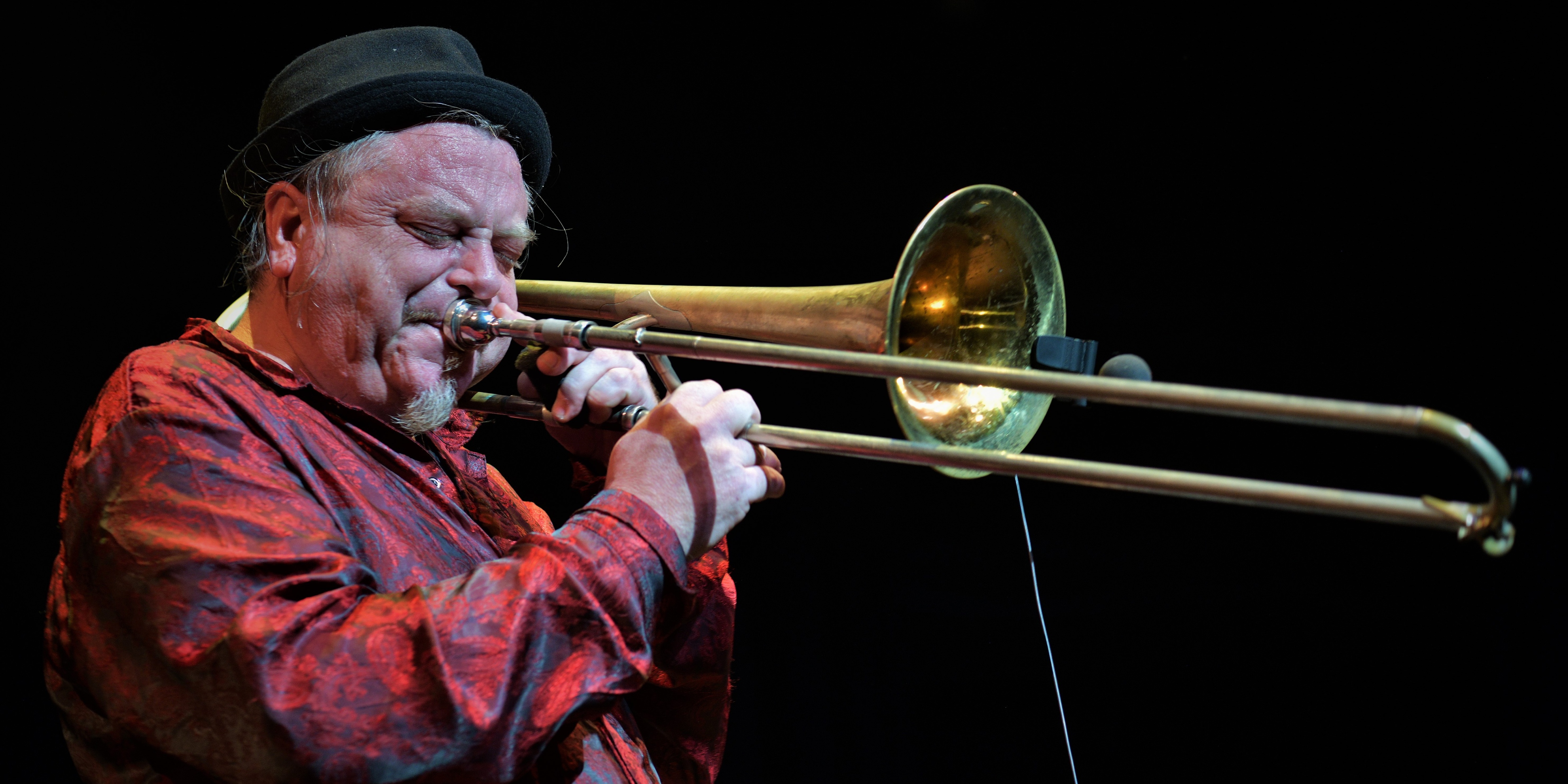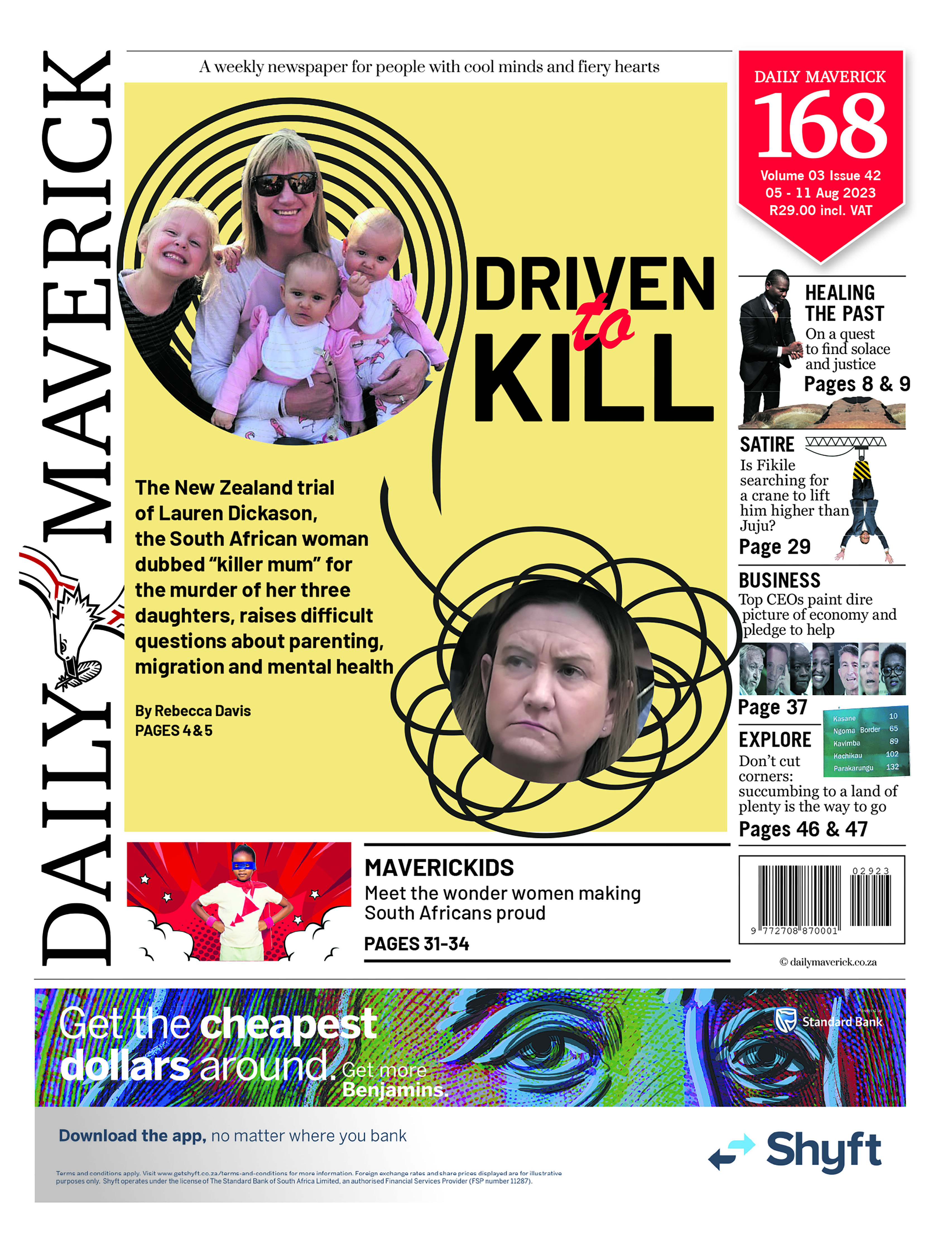MUSIC
Kesivan Naidoo and the jazzy big band that marches to the triumphant beat of his commanding drum

The jazz drummer has put together an ensemble of some of the biggest names in South African music. The result? An orchestral feast that has audiences on their feet calling out for more.
The Market Theatre foyer is packed to the rafters. I know this because I’m still outside with the merrily thronging throngs of people waiting to get in.
The vibe is thick in the wintry air, and it’s a good vibe, smiles and grins and winks abound. Sprinkled among the crowds are familiar and famous faces — music organisers, producers, musicians and magazine editors, everyone thickly layered in their favourite winter repellent.
Inside the auditorium the stage is bedecked in a brightly burst rainbow, visually reminding me of one of Kesivan Naidoo’s previous bands, Kesivan and the Lights. The hum has quietened down while people find their seats, but it’s still there, lending electricity to the air. When the band finally gets to the stage the audience erupts as one, easing the merry tension that’s been building from outside.
And what a band — 18 strong and made up for the most part of young South African greats (augmented by some very fine Swiss and German musicians, some known to South African jazz lovers through their contributions to local musicians’ catalogues).
Kyle Shepherd graces the piano; here’s brilliant vocalist and trombonist Siya Makuzeni; there’s Reza Khota, one of this country’s best and most innovative guitarists.
The concert begins with a cinematic introduction, with the high energy reminiscent of old-school Hollywood show tunes. Around six minutes in, I make a note that it’s always a good thing when heads in the orchestra stand are bopping along to the music when not playing. Smiles are exchanged between musicians, feet perpetually tapping.
The adjective “perpetual” is apt, as all the compositions seem to have a dynamo at heart, are to varying degrees propellent, tipped at a slight or giddy forward-leaning angle that is unflagging. These are drummer’s compositions, and it tells.
And Naidoo is no mere good drummer. He is sonically generous and in your face, always laid-back in physical demeanour behind the drum set, while his blur of hands and feet slip effortlessly from cheerful groove to all-out assault to filigree intensity and back, a casually masterful musician.
We’ve known this since long before his trek to America, fronting Kesivan and the Lights and appearing in such exciting bands as Babu and Closet Snare, since before The Lights planted a South African flame at the famed Carnegie Hall in New York and he began sitting in and studying with jazz legends such as Joe Lovano and Wayne Shorter.
Throughout the big band’s cheerful chops the atmosphere in the audience crackles. The merry tension I noted at the start of the gig never abates, merely shifts and stretches, frequently but only temporarily sated by bursts of applause or excited whoops. A friend whispers not too softly into my ear that this feels like a rock concert, and I get what she means.
Most serious jazz venues, like Naidoo’s own hallowed The Mahogany Room, later Straight No Chaser, are hushed spaces. There is a concerted silence in the audience as their ears respectfully follow every minute shift, every dazzling crescendo of the improvised compositions.
Only the occasional whoop or yelp is condoned, everyone knowing that the eruption is that of someone unable to contain their delight at a particularly striking or ingenious turn of phrase or musical resolution.
Tonight is a very different affair. Everyone is respectful, but the whoops and shout-outs come thick and fast. They’re taken in the band’s stride; the players understand the intention. For his part, Naidoo grins after nearly every holler from the electric audience, occasionally responding with a chuckle. Festivity is the name of the evening.
Throughout the compositions, arranged from selections of Naidoo’s back catalogue by the much-respected Switzerland-based horn player Adrian Mears — who has collaborated locally with the likes of Carlo Mombelli — Naidoo’s drumsticks are coolly assertive, directing the flow of audio tributaries from sudden Ellingtonian swells to high-definition lyricism.

Adrian Mears, originally from Australia and now a resident in Switzerland, was conductor and arranger, and featured on trombone. (Photo: Jonathon Rees)
The songs include his debut composition, “Eclipse”, which he dedicates to his grandmother; the riveting “Time of the Masters”, dedicated to “the masters who came before me”, citing, among others, Bheki Mseleku (who, when Naidoo was a tender 19, gave him a cherished gig), Hotep Galeta, Winston Mankunku Ngozi and Zim Ngqawana; a fantastically rhythm-hopping composition by Mears, aptly titled “Morphing Modulations”; the sci-fi inspired “Contact” with Makuzeni at some point on frenetic contrapuntal vocals; and a tribute to Madiba, “Freedom Dance”, which includes samples of his key speeches.
Following such a rich and expansive concert, encores were inevitable and robustly embraced by the listeners dancing in their seats. Though the concert was experienced through the expansive time-distortion of an adrenaline surge, every aural moment embroidered in detail, in the end, the sheer inexhaustible momentum of the performances made time zip by, and the audience was left deeply sated.
Daily Maverick spoke to Naidoo:
What’s it like being back in South Africa?
It’s amazing.
I miss South Africa a lot — I travel around a lot and live in other places, but a lot of what I do in those places has been informed by my upbringing and musical influences from South Africa. I guess that’s what makes me unique abroad, so coming back to that root is amazing. There’s nostalgia, there are all of these emotions, there’s a lot of past here, it’s where I grew up.
I guess it’s also bittersweet in a way because living in places [overseas] where things are really normalised… in SA we struggle with these things; that’s sad for me to see. The economic situation is getting worse, but through all of that, South Africans have this amazing resilience and still remain some of the friendliest people on Earth, you know?
The response [to my gigs] is fantastic, I mean home-crowd advantage. People know and respect me here in the jazz world and this comes across in the audience, especially in the concerts, where I really have a great rapport with the audience, which is basically my favourite audience in the world.
Tell us about the conception of your big band
When I wrote my music, especially on the “Brotherhood” record, a lot of it was envisioned to be larger. There’s always been an orchestral element to all of my compositions. It was a natural progression for it to be in a large ensemble such as a big band.
So there’s the normal components of big band, but we approach it with a more modern take on things, mixing many genres and styles. But the whole thing still needs to tell the story of the composition.
For this big band, I wanted to make sure that the journey, and the ebbs and flows of the story, were still prevalent, and that the individual musicians could still have their time in the sun, so to speak. Especially with the South African band it’s like an all-star configuration, which I thought about from the beginning when I came up with the idea for this big band.
I had the same members of The Lights in mind, and some of my favourite young musicians, and I managed to accomplish that. They said yes when I asked them to do the gig, which is a real big honour.
Any recordings we can expect?
The big band will be documented on DVD. We’ll release the Cape Town and Market Theatre gigs separately. I also have a dance project that I’m formulating and working on, called ‘Kesivan and the Beat Machine’, that could come out soon. Also, all of my past records are being rereleased in digital format this year.
The reason I’m doing [the dance project] is that the African side of jazz is extremely based in the rhythm. It’s a reform from Africa. A lot of the dance in the music is just a different approach, so I just want to explore that again, to focus on the dance element because especially in southern African languages here the word for “music”, “instrumental”, “singing” and “dance” is the same thing. And also, the reason South African musicians have this special edge internationally is because our audiences dance a lot anyway, so we have this inclination to be in that kind of groove, and I think that’s why The Beat Machine is a very important next exploration for me. DM
This story first appeared in our weekly Daily Maverick 168 newspaper, which is available countrywide for R29.





















Comments - Please login in order to comment.